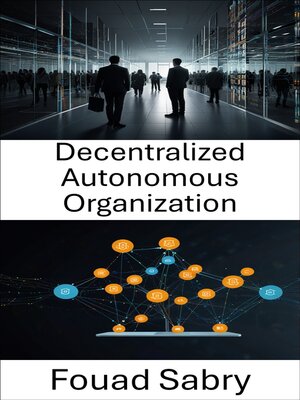Decentralized Autonomous Organization
ebook ∣ Empowering Trustless Systems Through Smart Contracts and Blockchain Technology · Decentralized Application
By Fouad Sabry

Sign up to save your library
With an OverDrive account, you can save your favorite libraries for at-a-glance information about availability. Find out more about OverDrive accounts.
Find this title in Libby, the library reading app by OverDrive.



Search for a digital library with this title
Title found at these libraries:
| Library Name | Distance |
|---|---|
| Loading... |
In an age where traditional political and financial structures are being reimagined, Decentralized Autonomous Organization offers an essential exploration into the transformative power of decentralized applications. Understanding DAOs is not just a technical endeavor—it's a foundational step in grasping the future of political science, governance, and societal coordination.
Chapters Brief Overview:
1: Decentralized autonomous organization: Explains DAOs' core principles and governance mechanisms.
2: Cryptocurrency and crime: Examines the intersection of crypto tools and illicit financial activities.
3: Cryptocurrency: Introduces digital currencies and their role in decentralized ecosystems.
4: Blockchain: Details blockchain as the backbone of trustless, distributed applications.
5: Build Finance DAO: Analyzes a realworld DAO case and its operational and legal implications.
6: Decentralized application: Defines dApps and their key role in reshaping digital interactions.
7: Decentralized finance: Surveys DeFi's challenge to traditional financial systems and power structures.
8: Dai (cryptocurrency): Describes Dai as a decentralized stablecoin with governance via MakerDAO.
9: Cardano (blockchain platform): Highlights Cardano's approach to scalable, sustainable blockchain tech.
10: Tron (blockchain): Outlines Tron's role in dApp deployment and userfocused blockchain features.
11: Polygon (blockchain): Explores Polygon's solutions for Ethereum scaling and interoperability.
12: Polkadot (blockchain platform): Discusses Polkadot's multichain framework and parachain structure.
13: Tokenomics: Introduces the economic design behind tokens and their influence on network behavior.
14: The DAO: Chronicles the rise and fall of The DAO, a foundational event in DAO history.
15: Cryptocurrency wallet: Breaks down types of wallets and their security role in dApp interaction.
16: Ethereum: Explores Ethereum's smart contract capability and decentralized ecosystem.
17: Uniswap: Analyzes Uniswap's decentralized exchange protocol and liquidity model.
18: Nonfungible token: Covers NFTs and their role in ownership, identity, and digital assets.
19: Smart contract: Explains smart contracts as programmable trust in decentralized platforms.
20: Solana (blockchain platform): Highlights Solana's highperformance chain for scalable dApps.
21: Ethereum Classic: Discusses Ethereum Classic's origin and its role in DAO history.
Whether you're a student entering the world of decentralized systems, a professional adapting to Web3, or a political science enthusiast rethinking governance, this book is your gateway. Beyond technology, it explores how DAOs reshape institutional power. The knowledge gained is far more valuable than its price.







